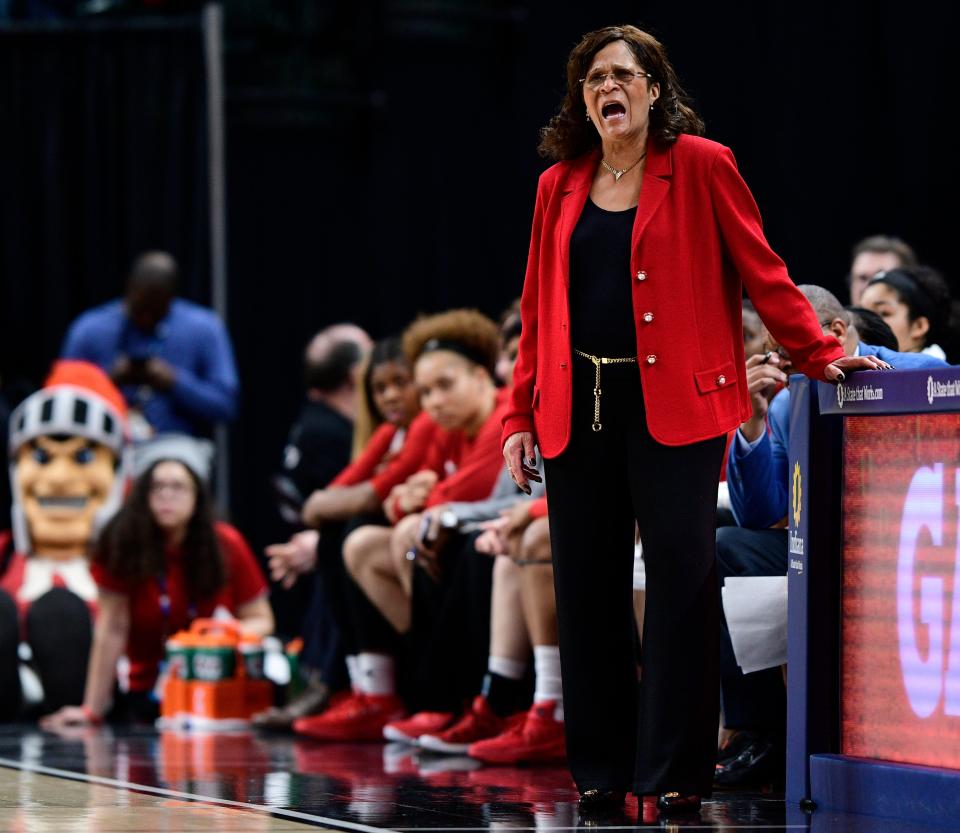Former Rutgers coach C. Vivian Stringer knew how to stand up to racism| Opinion
More than anything else, C. Vivian Stringer remembered being angry. She was so angry, in fact, that she hit her fist against a wall and it bled.
Stringer, who announced her retirement last week after 50 collegiate seasons coaching women, will be remembered for scarlet red. It is the primary color of Rutgers, the team she led to the brink of a national championship. And it is the color of the blazer she wore on April 10, 2007, when she sat before America at a news conference and denounced a racist.
“It’s about us as people,” Stringer said that day from Piscataway, New Jersey, flanked by her players, 80% of whom were Black. “When there is not equality for all, or when there has been denied equality for one, there has been denied equality for all.”
Stringer’s basketball team had just played for the national championship, losing 59-46 to Tennessee. It was the third school Stringer had led to the Final Four (one of them at an HBCU, Cheyney University), and yet it took a celebrity disc jockey named Don Imus to truly thrust her into the national spotlight. Imus made disparaging, and racist, remarks about the physical appearances of Rutgers players.
It was still an era when shock jocks routinely flung racist, homophobic, sexist and misogynistic comments at listeners. Before a smaller audience in a less-digital age, the exchange might have mostly gone unnoticed. Even the Rutgers players, who had just reached the pinnacle of their careers to that point, initially thought they might just let Imus’ words go.
But like their coach, they had that anger.
“Our moment was taken away, our moment to celebrate our success,” Heather Zurich, one of the white players on the team, said that day the team came together. “What hurts most about this situation is that Mr. Imus knows not one (of) us personally.”
Stringer and her team accepted Imus’ apology, but they also wanted him to look them in the eyes when he said he was sorry. He did so in a private meeting after the nation saw tears and self-empowerment at their very public news conference.
DAN WOLKEN: Mark Emmert was a failed NCAA president. But removing him won't solve college sports' problems
NET GAIN: Dawn Staley aims to give 2022 women's championship net to Black journalists
Essence Carson, who went on to play 13 seasons in the WNBA, was the team captain in 2007 but an introvert whom Stringer urged to speak that day.
"It doesn't matter that you're afraid, that's a normal thing," Carson said in 2021 as part of a panel for social change. "What matters is what you do to overcome that fear in order to use your voice the way you should. Because you're not only using it for yourself, you're using it for all the people that aren't heard, all the people that have been blatantly ignored."
Sponsors immediately began pulling out from Imus’ show. He was soon fired by CBS. He was condemned in the news media and by presidential hopeful Barack Obama. His high-profile career was essentially finished.
When Imus died of lung cancer in late 2019, Stringer shared how he told her when they met that he “didn’t come to save his job, but to save his soul.”
The story of Stringer and Imus had legs for days, if not weeks, but then it was gone from the news cycle. Today, the story is played out on a continuous loop. We’re not desensitized to words, like the former name of Washington’s NFL team, anymore just because we hear them so much. Our eyes are open wider.
In Stringer’s own sport, players have helped expose vast inequities in support from the NCAA compared to what men’s players get. As women's coaches, including South Carolina's Dawn Staley, a two-time national championship winner, have spoken out for racial and gender equity, they have had a powerful example.

"I have always embraced my role as dream merchant for my players," Staley wrote in a letter to Stringer published by The Undefeated in 2018, "but it took your vision to expand mine, to remind me that my reach goes beyond those I see every day. You reminded me to be what you are - an advocate, a voice for our game and for every young woman who wants to participate in it in whatever form or fashion she chooses."
Stringer, 74, was once embarrassed at the attention of being recognized by the school board for her good grades and for being the first minority cheerleader at her western Pennsylvania high school.
The coal miner's daughter grew into the first Black basketball coach to reach 1,000 wins whose voice was just as significant as her achievements.
"Would I like to win a national championship? Yes, I would love to win a national championship," Stringer told The Players’ Tribune in 2018, "If I could win a national championship or somehow effect change in the world, then you know what? I’d rather effect change in the world.”
Follow Stephen Borelli on Twitter @StephenBorelli
This article originally appeared on USA TODAY: C. Vivian Stringer was trailblazing coach who stood up to racism

